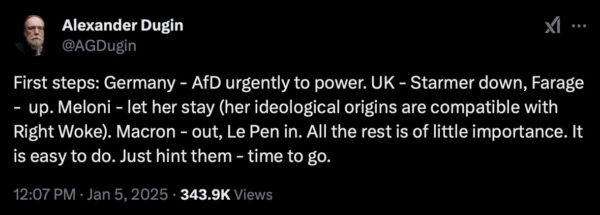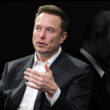When Elon Musk threw his support behind Donald Trump’s campaign in the summer, most analysts perceived him as just another wealthy donor, albeit one with control over a major social network. But Musk has since rapidly raised his profile and increased his influence — constantly by Trump’s side at Mar-a-Lago, promising to head up the “DOGE” spending advisory commission, and increasingly interfering with the politics of other countries, notably the United Kingdom, Germany, and France. Many expect Musk to be brought to heel after January 20th, or that Trump and Musk are headed for a personal conflict, but there are reasons to question that narrative.
First, let’s examine the mechanism of Musk’s influence. With over 210 million followers on his social network, X, he is able to quickly shape the global discourse with a single offhand thought, the more inflammatory the better. Hives of click-hungry news outlets react in formation, helping to amplify his message. Thousands of influencers rush to be first to farm engagement dollars from spreading his views. And politicians and businesspeople update their mental calculus around whether their own positions are likely to reap favor or punishment relative to Musk’s latest pronouncements. This is a forceful mechanism, especially when so many are motivated by money or careerist objectives. Politicians in particular do not want to face election challenges or get caught out on an enemies list, backed by an infinitely wealthy adversary.
Back in 2017, Peter Thiel allies Jeff Giesea and Charles Johnson described this mechanism as “memetic warfare,” or more popularly “meme magic.” Other conceptions center around the idea of “chaos magick,” which has been adopted by influential Russian geopolitical strategist Aleksandr Dugin. Seen through this lens, Musk’s information warfare is most succinctly framed as a kind of occultism, and his efforts are more akin to casting magic spells than any kind of “journalism” or “free speech,” as he so often insists. In the modern global information milieu, we have a better view of how this kind of base occultism actually works. Ultimately, this approach is wholly reliant on the effects of his words and actions, rather than any truth, falsehood, or logic behind his statements.

Aleksandr Dugin and Elon Musk have exhibited increasing alignment. (Source: X)
With that decoded, the question becomes whether anyone can curb his influence with standard institutional mechanisms. It may prove difficult. Musk has (along with others) managed to effect the resignation of Justin Trudeau, long a target of his derision. He has gone up against Nigel Farage and the Reform Party in the UK over its position on controversial racist agitator Tommy Robinson (aka Stephen Yaxley Lennon). French President Emmanuel Macron has said that Musk is leading a ‘new, international reactionary movement,’ consistent with Aleksandr Dugin’s Eurasian network of reactionaries. And Musk has earned ire and increasing scrutiny in Germany after writing an op-ed backing the far-right Alternative für Deutschland (AfD) party, which many believe is the modern successor to Hitler’s Nazi regime.
Musk appears undaunted as these governments consider remedies like fining him, seizing his and his companies’ assets, or banning services like X within their borders. And arguably, they should pursue these remedies. But expect Musk to go into full war mode, calling out and denigrating specific policymakers and politicians, and anyone else standing in his way. Jess Phillips, a Labour Party politician who has been the target of Musk’s ire over the issue of so-called “grooming gangs” in the UK, says that Musk’s online abuse has “turned her world upside down.” No doubt this is true, and other policymakers are looking to her case as they consider the personal and professional consequences of standing in his way.
Technical solutions such as blocking the X network within specific national borders may not be effective, either, especially as location-hiding Virtual Private Networking (VPN) and satellite internet solutions such as Musk’s own Starlink become increasingly popular with consumers. Musk’s influence on policymakers and the impossibility of technical blockades may ultimately drive policymakers towards accommodating his demands.
Not everyone in the MAGA coalition is happy with Musk’s influence. Steve Bannon recently called Musk out for behaving like a “toddler.” Laura Loomer, a longtime MAGA firebrand and on-again off-again Trump confidant, has been especially upset with Musk’s influence over Trump. Raheem Kassam, a longtime associate of Bannon and Farage, called Musk a “moron,” and alt-right provocateur Charles Johnson (of memetic warfare fame) has vowed to “fight back” against Musk. While this opposition might seem to bode poorly for Musk’s future with MAGA, his ambitions appear to go well beyond merely being part of the MAGA gang, but to reshape it in his own image.
While this interregnum period offers exceptional plasticity for shaping discourse, many expect more message discipline to emerge on January 20th, when Donald Trump is inaugurated and Chief of Staff Susie Wiles is installed. Alva Johnson, a staffer who has worked under Wiles, told me that she “will not tolerate disorder and chaos,” and that Wiles’ recent remarks to Axios about icing out outside troublemakers were likely directed at Musk. And while Wiles has longtime ties to interests connected to Russia and would seem to be compatible with Musk and his agenda, it’s not difficult to see why Musk’s 3am tweet-rants might agitate a disciplined leader like Wiles.
Accordingly, many expect that Wiles will bring Musk to heel. But this remains to be seen. Though Wiles can dramatically limit Musk’s access to Trump through scheduling and deciding other West Wing realities, he might retaliate and undermine her with memetic warfare at any time. The two seem destined to have a meeting of the minds. And of course, lost in the shuffle is JD Vance, who has become all but invisible compared to “first buddy” Musk.
Ultimately, Musk’s final nemesis may be Musk himself. Reports of his drug use persist (especially ketamine, for which he has said he has a prescription), and he, inexplicably, has become one of the top players of an occult-themed videogame called Diablo IV. How he has the time to do all of this while “running” several high profile companies worth hundreds of billions of dollars raises serious questions about his state of mind and whether he has engaged with other people (see: Adrian Dittmann) who are pretending to be him, for purposes of driving information warfare and controversy. At the end of 2024, Musk assumed the identity of “Kekius Maximus” on X, which his cultists found amusing as journalists were forced to spread his idiocy — a reference to meme culture and Russell Crowe’s character in the movie Gladiator. Hilarious.
As frequently occurs with powerful people, it seems that there is no one around him to tell him “no” as he indulges his darkest fantasies. Claire Boucher, Musk’s ex-partner and a musician who is known professionally as “Grimes,” is the mother of three of his children, improbably named “X Æ A-Xii”, “Exa Dark Sideræl” and “Techno Mechanicus Musk.” She has said that she is his best friend, and fully devoted to “the mission” of “making humanity a multiplanetary species and preserving consciousness.”
Musk’s mother, Maye, has been his companion to dozens of high profile events. And Musk’s father has been making the podcast circuit, where he’s confirmed that Musk is named after a character called “the Elon,” in a sci-fi story by Third Reich rocket scientist Wernher von Braun. That character’s destiny is to colonize and govern Mars.
In poker, one would say that Musk is “all in,” and that he can no longer afford to lose. His life trajectory seems more likely to be tragic and shortened, rather than long and heroic, as he desires. He is rapidly making himself into a global pariah, and is likely to become persona non grata in many countries. Ever-increasing isolation coupled with intensity, adrenaline, and drug use is usually a death sentence, and it seems likely that he may end up following in the footsteps of infamous Jonestown cult leader Jim Jones — but at a much larger scale. The question we should ask is how to minimize the damage he can inflict on the world in his downward spiral.
Dave Troy is an investigative journalist focused on exposing threats to democracy. Based in Baltimore, his background as a technologist with an interest in studying online extremism affords him a unique perspective. His work has appeared at MoMA in New York, and he is a fellow with New America Foundation’s Future Frontlines. Dave writes regularly about information warfare, history, and politics. He is the host of the podcast Dave Troy Presents, and speaks regularly at conferences on disinformation, extremism, and information warfare. Contact information is available at davetroy.com.







Musk did not trigger Justin Trudeau’s resignation. Trudeau is highly unpopular after being in power for 9 years… calls for him to step down by Canadians, and members of the Liberal Party were ongoing.